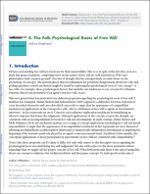Chapter 4 The Folk Psychological Roots of Free Will
| dc.contributor.author | Shepherd, Joshua | |
| dc.date.accessioned | 2021-06-07T12:35:04Z | |
| dc.date.available | 2021-06-07T12:35:04Z | |
| dc.date.issued | 2017 | |
| dc.identifier.uri | https://library.oapen.org/handle/20.500.12657/49427 | |
| dc.description.abstract | Debates surrounding free will are notorious for their intractability. This is so in spite of the fact that, even at a fairly fine grain of analysis, competing views on the nature of free will are well understood. Why can’t philosophers find common ground? One line of thought that has emerged fairly recently draws on the psychology of concepts. The general idea is that an explanation for persistent disagreement about free will, and perhaps guidance toward resolution, might be found by exploring the psychological roots of “our concept” of free will—for example, those psychological factors that underlie our tendencies to say, of some bit of human behavior, that it was performed of an agent’s own free will, or not. | en_US |
| dc.language | English | en_US |
| dc.subject.classification | thema EDItEUR::Q Philosophy and Religion::QD Philosophy | en_US |
| dc.subject.other | free will; psychology | en_US |
| dc.title | Chapter 4 The Folk Psychological Roots of Free Will | en_US |
| dc.type | chapter | |
| oapen.relation.isPublishedBy | 066d8288-86e4-4745-ad2c-4fa54a6b9b7b | en_US |
| oapen.relation.isPartOfBook | 9421e6b5-b64b-4206-b467-8510b6ea497a | en_US |
| oapen.relation.isFundedBy | d859fbd3-d884-4090-a0ec-baf821c9abfd | en_US |
| oapen.collection | Wellcome | en_US |
| oapen.pages | 14 | en_US |
| oapen.place.publication | London | en_US |

